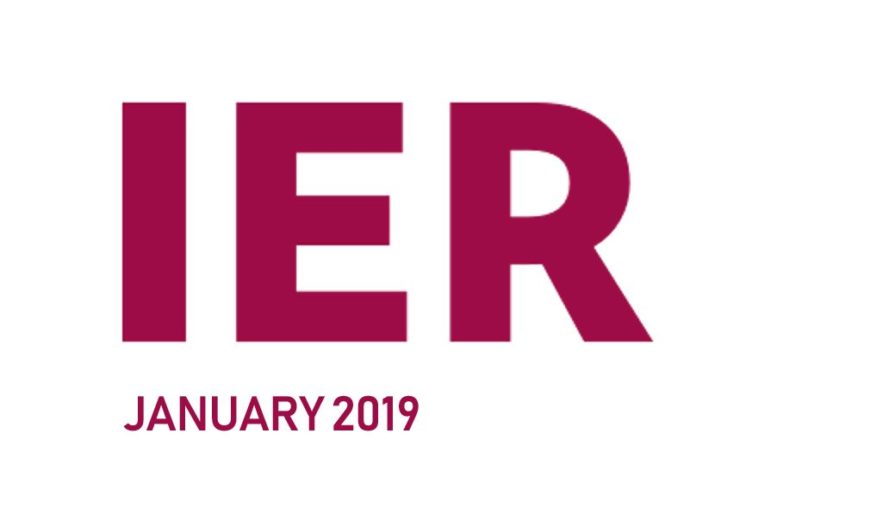Employment Law news roundup – December/January
Happy New Year! The Institute of Employment Rights' weekly news brief took a break over the festive period, but now we're back with a roundup of all the news you may have missed while we were away.

‘Gig’ economy
Perhaps the most important employment law news in December came in the shape of the government’s update on its Good Work Plan – a programme of reforms ostensibly launched to resolve ongoing workers’ rights breaches in the gig economy.
Touted as the “largest upgrade in a generation to workplace rights” (more a sad indictment of the government’s complacency than an achievement), the Good Work Plan takes forth 51 of the 53 recommendations in the Taylor Review, including repealing the Swedish Derogation (removing the ability for agencies to pay temporary workers less than their permanent colleagues); giving all people in employment the entitlement to a written statement of their rights; increasing the penalty for employers that act in spite, malice or gross oversight; and making it easier for workers to take part in Information and Consultation arrangements (a weak alternative to trade union activity, which has proven largely unpopular with workers).
With one in ten workers currently in insecure jobs and real wages still stagnant a decade on from the financial crisis, these proposals tinker around the edges without committing to the reforms workers need to enjoy a stable and productive working life. As a result, they were widely criticised by trade unions and parliamentarians.
Elsewhere, more news on Uber. The Court of Appeal has confirmed that Uber drivers are ‘workers’, not independent contractors in business for themselves. The judges concurred with the Central London Employment Tribunal that there was a “high degree of fiction” in the contract between the company and its drivers.
Public sector
After the Department for Education released the results of a survey showing that 40% of people think they would make good teachers, the NEU and NASUWT pointed out that the government seems to be avoiding the question of why there is still a recruitment and retention crisis in the sector. The unions blamed low pay, “crushing” workloads and “attacks on professionalism” for putting people off becoming a teacher – the very factors that drive two-thirds of educators to say they wish they had chosen a different career.
The Department for Business, Energy and Industrial Strategy (BEIS) has also appeared uncommitted to its ostensible objectives to improve workers’ rights, as a strike by low-paid staff at the department was announced on the same day the government launched its so-called ‘Good Work’ plan.
Meanwhile, the United Voices of the World (UVW) trade union are planning an overlapping 48-hour walkout at the Ministry of Justice, calling for the living wage for outsourced workers as well as equal terms with civil servants regarding sick pay and annual leave. Members of UVW voted unanimously for the action, the union said.
The Department for Transport also faced protests from members of RMT, after Secretary of State Chris Grayling refused to ensure union rights on Brexit ferries in the event of a No Deal Brexit.
Pay
Listed companies with over 250 employees are now required to record the ratio of pay between their CEO and their average worker after new regulations came into force on 01 January 2019. They will be asked to report their findings annually from 2020, at which point they will be asked to justify the gap between high and low earners.
Reports must include the median average pay of the lower quartile of a firm’s workers, the median average pay of the upper quartile, the CEO’s pay, and details of how the directors take both stakeholder and employee interests into account.
TUC General Secretary, Frances O’Grady, said more transparency over pay would help unions to put pressure on those companies with large wage gaps, but added that the new rules do not go far enough, calling for a mandatory requirement to have workers on boards.
Fat Cat Friday – the day on which the average FTSE 100 CEO has already been paid more than the average workers’ annual wage – fell this year on 04 January. The Equality Trust reported that the pay at the top is now 321 times the minimum wage and 133 times that of the average worker after the inequality gap widened yet again in 2018.
Equality
The government’s commitment to equality has been thrown into question by its failure to lead by example, as it is revealed that the gender pay gap has widened at almost a third of Whitehall departments.
Elsewhere, a new code of practice for tackling sexual harassment in the workplace was launched by the government, but has been widely criticised as inadequate. The code was drawn up in response to a damning report on workplace harassment by the Women and Equalities Committee, but the Committee expressed disappointment that the government had not included its recommendations to put the onus on employers to protect workers from sexual harassment. This flaw in the new code of practice also proved to be the most unpopular aspect with campaigning groups.
Pay disparities for BAME workers were also in the news around Christmas, with think tank the Resolution Foundation reporting that the 1.7m non-white employees in the UK are facing a £3.2bn wage penalty.
Young people, too, are facing challenges earning enough money, with over one-third having been offered a zero-hours contract and one in five illegally underpaid.




